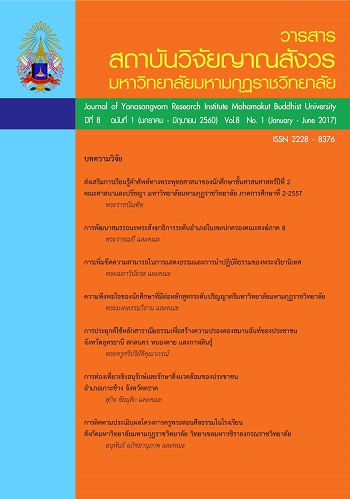Temple Administration from the Postmodern Paradigm: A Case Study of Wat Na Phrathat, Nakhon Sri Thammarat
Main Article Content
Abstract
The purposes of this research were to study the principles of administration of temple in Buddha's lifetime, the Buddhist postmodern age, and in the Wat Na Phra Borommathat Nakhon Si Thammarat Province, to study the postmodern philosophy as the tool to solve the problems, to apply the postmodern philosophy to manage the Wat Na Phra Borommathat Nakhon Si Thammarat Province, body of knowledge and pattern of Temple administration based on the postmodern philosophy. This research was a qualitative method. The methodology of the study is a Research Methodology in philosophy and Religion. The Hierarchy of clergy in the Buddha's lifetime was non-format. It was different to the clergy organization nowadays. In the past time, each clergy were live together, have the same rights, help each other, do their own duty under the Lord’s discipline. It’s called Ruling by Dharma. The Lord Buddha ordered to use the Dharma as the regulations among the clergy. At the present day, there has been enacted legislation to support the administration of the clergy and use hierarchy system of the Thai clergy since Sukhothai to Rattanakosin period. Currently, The administration of community and temple were centralized under the concept of modernism, as a result the management is inefficient, lack of freedom for creative work, lack of self-management, and separated from the community. There was application of the post modernist philosophy and other basic philosophies to be a new framework for management. The integration of the modern management sciences to the discipline to manage human resources and the good governance were used, and bring them to manage the temple. With the transparent administration of community involvement, can be checked and balanced, and have fully impact to postmodern society. Temple staff can manage the clergy affair effectively, the organization was strengthened, and it is also a way to create stability to the country.
Article Details
References
ธรรมทาส พานิช. (2542). ไชยา : ที่ตั้งนครหลวงของอาณาจักรศรีวิชัย. กรุงเทพมหานคร : อรุณวิทยา และธรรมทานมูลนิธิ.


